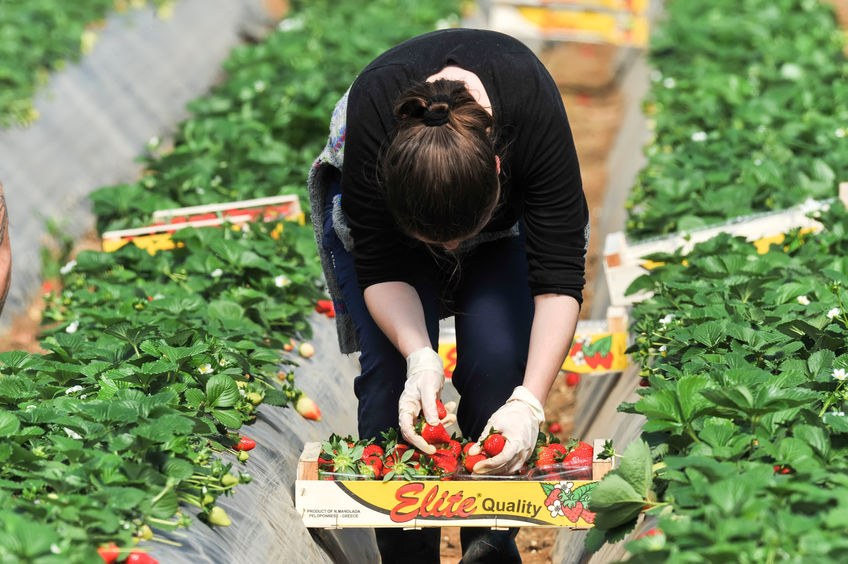
The government has been urged to scale up the quota of non-EU nationals that are being allowed to take up seasonal farm posts after Brexit.
A leading industry figure made the plea as he appeared in front of a Westminster committee to give evidence on any new immigration system after the UK leaves the EU.
NFU Scotland’s Horticulture Working Group Chairman, James Porter, appeared in front of the influential committee of MPs to give evidence on the government’s Immigration and Social Security Coordination (EU Withdrawal) Bill.
The bill will repeal free movement after the UK leaves the EU and will set up the framework upon which the government will create a new immigration policy after EU exit.
It comes as many farming businesses have faced seasonal worker shortages of up to 15 per cent.
The committee has been charged with line-by-line scrutiny of the bill. But NFU Scotland said any new immigration system after Brexit must ensure that workers from the EU and outside the EU can still come to the UK to take up posts in seasonal and permanent positions.
Since the vote to leave the EU, farming unions and organisations have campaigned the government on the reliance of the agricultural industry and the entire food and drink supply chain on non-UK workers.
Labour shortages
Giving evidence to MPs, Mr Porter outlined that in the last year alone, many businesses have faced seasonal worker shortages of up to 15 per cent.
Many soft fruit and field vegetable businesses will employ hundreds of non-UK nationals to undertake seasonal work, with a large proportion returning year-on-year to undertake skilled husbandry, picking and packing work, as well as other roles.
He also set out that whilst shortages within the horticultural sector have been particularly stark, there are concerns across the industry, with virtually no sector of agriculture not relying on non-UK workers for either primary production or further along the chain.
The government has been urged to scale up the quota of non-EU nationals that are being allowed to take up seasonal posts for a trial period in 2019 and 2020 under the pilot seasonal agricultural workers scheme.
Currently the scheme will allow 2,500 non-EU nationals to take up posts whilst freedom of movement is still in operation during the Brexit transition.
However, based on projected shortages within the industry, it is understood that 10,000 non-EU nationals will be needed within the sector in 2019.
Status of EU nationals
The government has also been told to clarify the status of EU nationals in the event of a no-deal Brexit.
Advice from the government suggests that in the event of 'no-deal', EU nationals will still be able to come to the UK for a three-month period, following which they will need to apply for an extension of up to three years.
This is causing EU nationals considering roles in the UK a 'huge amount of uncertainty', Mr Porter said. NFU Scotland is calling on the government to extend the period to 12 months.
The government is also currently consulting on a new immigration system which will allow ‘low skilled’ workers to come to the UK to take up posts for up to one year, immediately followed by a 12-month ‘cooling off’ period.
It is the NFU Scotland position that for farmers who employ workers, this proposal would be 'totally unworkable' and a 'disincentive' to employing staff and training them up, only for them to have to leave after the initial 12 months.
Any new immigration system must allow individuals to take up posts and upskill in those posts, with a view to staying on for a longer period or permanently, the union said.
Wage threshold
The government is also consulting on whether a wage threshold of £30,000 should apply for any prospective migrants coming to take up posts in the UK.
However, NFU Scotland has strongly refuted this proposal as an arbitrary threshold with 'little or no basis' in the reality of employment patterns within agriculture or food and drink processing.
Addressing the Immigration Bill directly, Mr Porter set out the union’s opposition to ending free movement of people between the UK and EU and outlined that any new visa system must be based on labour market need rather than arbitrary targets based on supposed levels of skill or wage thresholds.
He said: “The worker shortages within my own sector of horticulture have been well documented.
“Within horticulture and across the whole agricultural industry we rely on non-UK nationals to undertake manually skilled work on both a seasonal and a permanent basis.
“The government’s own Migration Advisory Committee has recognised that these gaps cannot be filled by workers from the UK.”
Mr Porter added: “NFU Scotland is very concerned about the obstructive position of the government towards immigration and is lobbying hard to ensure any new system realistically and reasonably allows nationals from inside and outside the EU to take up posts where we have gaps in our labour-market. The system must be needs-driven; not ‘skills’-driven.”
